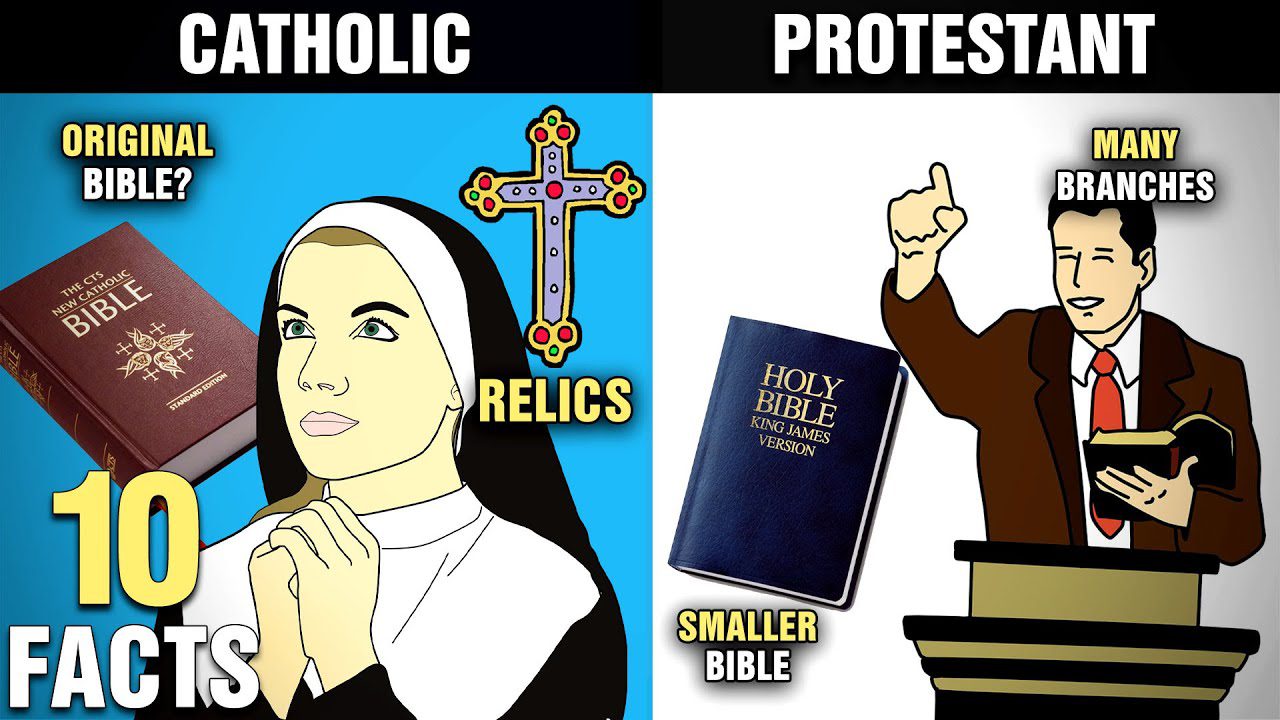Catholicism and Protestantism have fundamental differences when it comes to authority, saints, sacraments, priesthood, church structure, the Bible, justification, liturgy, tradition, and salvation. In Catholicism, the Pope is regarded as the ultimate authority, while Protestants believe that the Bible is the only authoritative source. Catholics venerate saints and Mary and believe in purgatory, while Protestants reject these beliefs. Catholicism has seven sacraments, while Protestantism only recognizes two. Catholics have a hierarchical priesthood, while Protestants believe in the priesthood of all believers. Catholicism has a highly centralized structure, while Protestants are highly decentralized. Catholics use the Deuterocanonical books or Apocrypha, while Protestants use the Jewish canon of the Old Testament. Catholics believe in justification by faith and good works while Protestants believe in justification by faith alone. Catholic liturgy is highly structured, while Protestant worship services vary greatly. Catholics value tradition, while Protestants value the Bible and its interpretation. Finally, Catholics believe that salvation is achieved through faith, good works, and the sacraments, while Protestants believe it is achieved through faith alone.
1. Authority
One of the fundamental differences between Catholicism and Protestantism is the question of authority. In Catholicism, the Pope is regarded as the ultimate authority in matters of faith and morals, as he is believed to have been given the power of apostolic succession from St. Peter, the first pope. On the other hand, Protestants believe that the Bible is the only authoritative source in matters of faith and practice.
2. Saints and Mary
Catholics venerate saints and Mary, and ask for their intercession. They also believe in the concept of purgatory, where souls are purified before entering heaven. Protestants reject this belief and do not pray to saints or Mary.
3. Sacraments
Catholicism has seven sacraments, which include baptism, confirmation, Eucharist, confession, marriage, holy orders, and the anointing of the sick. Protestantism generally only recognizes two sacraments: baptism and the Eucharist.
4. Priesthood
Catholicism has a hierarchical priesthood with ordained priests, bishops, and deacons. The Eucharist can only be consecrated by a validly ordained priest, who acts “in persona Christi” or in the person of Christ. Protestants believe in the doctrine of the “priesthood of all believers,” which means that all Christians have equal access to God without the need for an intermediary.
5. Church structure
Catholicism has a highly centralized structure with the Pope as its head. Protestantism is highly decentralized, with each denomination having its own structure and leadership.
6. Bible
While both Catholicism and Protestantism affirm the Bible as the inspired word of God, the Catholic Church includes additional books in their canon, known as the Deuterocanonical books or the Apocrypha. Protestantism uses the accepted Jewish canon of the Old Testament.
7. Justification
Catholicism believes in the concept of justification, which means that through faith and good works people can be made righteous in the eyes of God. Protestants, on the other hand, believe in justification by faith alone, which means that people are made righteous solely through their faith in Jesus Christ.
8. Liturgy
Catholicism has a highly structured liturgy with specific prayers, rituals, and traditions. Protestant worship services can vary greatly from denomination to denomination, and often emphasize the preaching of the word.
9. Tradition
Catholicism puts an emphasis on tradition and the continuity of the Church throughout history. Protestants tend to value the Bible and its interpretation over tradition.
10. Salvation
Catholics believe that salvation is achieved through faith, good works, and participation in the sacraments, while Protestants believe that salvation is achieved through faith alone.
